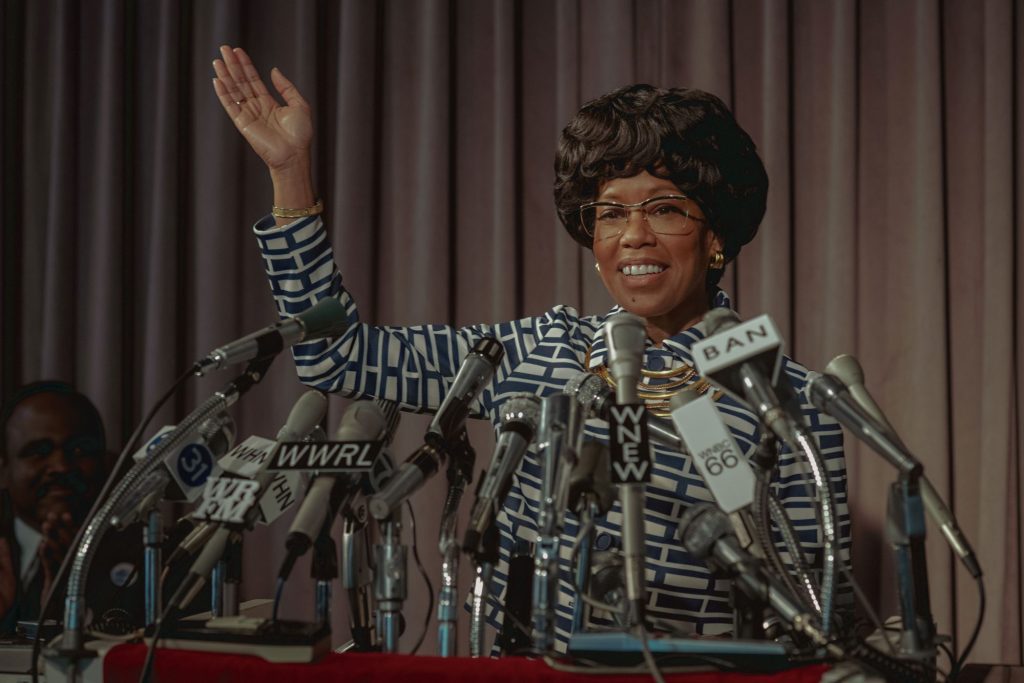Can two hours truly capture even a portion of someone's actual life, portrayed?
The biographical movie genre essentially invites failure, or at least a sequence of storytelling concessions made under pressure from numerous sources: the actual person being depicted, or guardians of the deceased person's estate, concerned about an unsympathetic truth or two; the streaming platform or studio supporting the project; and the filmmakers themselves, striving to accurately represent the person featured in the title, while finding a structure — and the perfect actor — to make the project successful.
“Shirley,” now available on Netflix, represents the most recent frustrating, two-hour instance of all that pressure. However, no signs of pressure are evident in Regina King's meticulously detailed portrayal of Shirley Chisholm, the initial Black female member of the U.S. Congress, who sought the Democratic presidential nomination in 1972.
Observing King in scenes with the late, great Lance Reddick (portraying Chisholm advisor Wesley “Mac” Holder), or Terrence Howard (as Arthur Hardwick, her second husband; they met as New York State legislators in 1966), or André Holland (as Chisholm’s rival presidential hopeful Walter Fauntroy), you can appreciate the skills of these performers — their effortless delivery of even the most extensive exposition. This is also difficult to avoid in any biopic: those moments when two characters are supposed to be conversing as if they know each other well, and are well-versed in the background or context of whatever they're discussing. The issue is, the audience isn't. Consequently, the dialogue starts sounding like they are addressing the viewer with bullet points.
“Shirley” grapples with several such instances. Writer-director John Ridley, who also produced the film, dedicates the two hours he has to a few months in ’72, when Chisholm faced the political challenge of her life, seeking 1,500 delegates amidst a predominantly male sea of doubt. Nixon was poised for a second Republican term prior to Watergate; at that time, scandalous and/or illegal presidential activity was enough for a large majority of the ruling party to abandon the current leader. McGovern, the clear Democratic front-runner, seemed inevitable despite ultimately being defeated by Nixon.
Did Chisholm and her more prominent, better-funded rivals, from Humphrey to Muskie to Lindsay, have a chance? No and yes. Campaigns hinge on a sequence of unforeseen events and fateful choices. In America, we are captivated by underdog tales because they often involve unlikely candidates who emerge victorious. “Shirley” cannot unfold in that manner, although Chisholm proved to be a profoundly inspirational political figure. She had her sights set on the future, whether or not she would lead the country in that future.
I would have preferred the movie to present those hectic campaign months in a more convincing manner, without quite as many speech-like portions even when nobody is delivering a speech. In a brief scene from Chisholm’s first year in Congress, five minutes into “Shirley,” there's a confrontation with a bigoted white Southern politician, upset about this intruding Black woman from Brooklyn earning the same $42,500 annual salary as him. Does the scene effectively convey its message? Only as simplistic shorthand. It feels more like a biopic striving for momentary impact, rather than a revealing fragment in a true-to-life story.
The actors are trying their best all the time. Lucas Hedges plays young law student Robert Gottlieb, who at 21 became Chisholm’s national student organizer; Christina Jackson, who effectively shows campaign worker and future Congresswoman Barbara Lee’s conflicted feelings about politics, adds welcome subtlety. Along with Reddick and company, these two support a script gradually struggling more and more.
King is in charge, as usual. Her real-life sister Reina King plays Chisholm’s sister Muriel, resentful of Shirley’s favored-daughter status. In their scenes, and in every scene elsewhere, the top-billed Oscar winner (King won for her work in “If Beale Street Could Talk”) works wonders in selling what’s overstated in an understated, humanizing way. Chisholm came from Guyanese and Bajan (Barbadian) descent, and while King doesn't use some vocal specifics (the sibilant “s,” mainly) she evokes Chisholm’s public persona and refreshing honesty very well.
Writer-director Ridley, who won his own Oscar for adapting “12 Years a Slave,” has done solid work (the recent Apple miniseries “Five Days at Memorial”) and at least one directorial documentary project, the 1992 Los Angeles uprising documentary (“Let It Fall”), that is very close to great. With “Shirley” we’re close to almost-not-quite territory, and visually, Ridley sticks with conventional shot sequences of characters in frame, alone, either speaking or reacting. This makes fluidity and interpersonal flow pretty difficult. The political specifics of Chisholm’s presidential bid, and the question of why so many other candidate’s delegates got funneled into McGovern’s losing campaign, never risk much complication. Time is too short.
At one point King, as Chisholm, resists the advisors’ pleas to simplify her “messaging” (was that word in circulation 52 years ago?) by saying: “I am not leaving out the nuance!” In “Shirley,” the top-shelf actors aren’t, either. Even if their material does.
Michael Phillips is a Tribune critic.
“Shirley” — 2.5 stars (out of 4)
MPA rating: PG-13 (for profanity including racial slurs, brief violence and some smoking)
Running time: 1:57
How to watch: Now streaming on Netflix.









